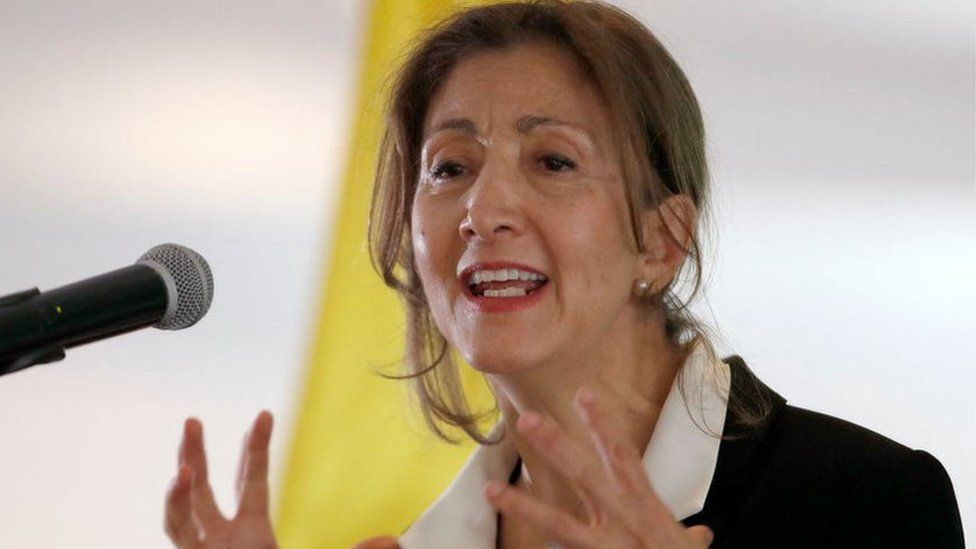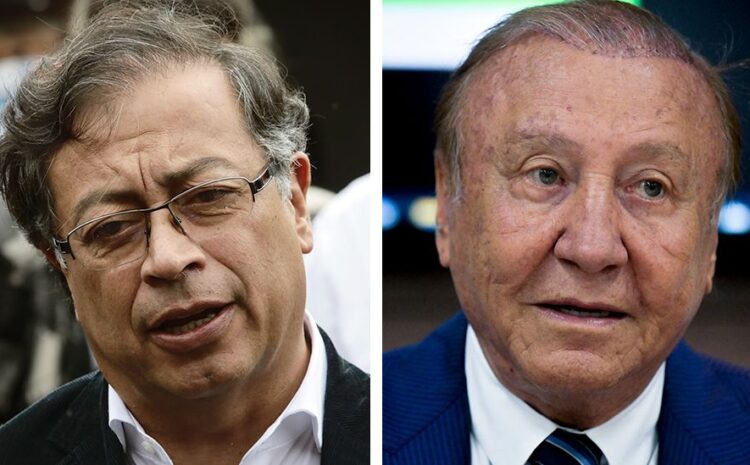
IMAGE SOURCE, ANADOLU AGENCY/AFP VIA GETTY IMAGES Image caption, The second round will see ex-rebel Gustavo Petro (left) running against 77-year-old Rodolfo Hernández Colo
By Vanessa Buschschlüter
BBC News Online Latin America editor
Voters in Colombia, who have never before elected a left-wing leader, overwhelmingly cast their ballots for ex-rebel Gustavo Petro.
But while Mr Petro secured a 12-percentage-point lead over his nearest rival, he did not gain the 50% needed to win outright.
He is joined in the second round by 77-year-old businessman Rodolfo Hernández, whose savvy campaign on social media proved an unlikely success with voters.
Both candidates have promised to change Colombia and shake up its politics, which for decades has been dominated by a small and powerful elite in the capital, Bogotá.
But with the candidates’ backgrounds and policy proposals poles apart, voters will have to decide what kind of change they want before they cast their ballots in the run-off election on 19 June.
Rodolfo Hernández: The surprise contender
When the campaign for the presidency started, millionaire construction magnate Rodolfo Hernández was little known outside of Bucaramanga, the city where he served as mayor from 2016 to 2019.
At first, his videos on social media platforms like TikTok caused amusement and he was thought to stand little chance against his better-known rivals.
For months, opinion polls suggested the run-off would be between Gustavo Petro, the left-wing contender who has led in the polls from the start, and the conservative candidate, Federico “Fico” Gutiérrez.
After all, Mr Gutiérrez was running for a coalition of conservative parties and had all the resources and political experience of those parties at his disposal.
Rodolfo Hernández, on the other hand, is standing as an independent candidate.
But with Colombians disenchanted with politics as usual, the factors which should have hampered Mr Hernández’s campaign, ended up boosting it.
He also did not hold traditional rallies and shunned TV debates, instead communicating with his followers via short messages on TikTok.
His followers on the social media platform soon grew to over half a million and his videos have have had more than four million likes.
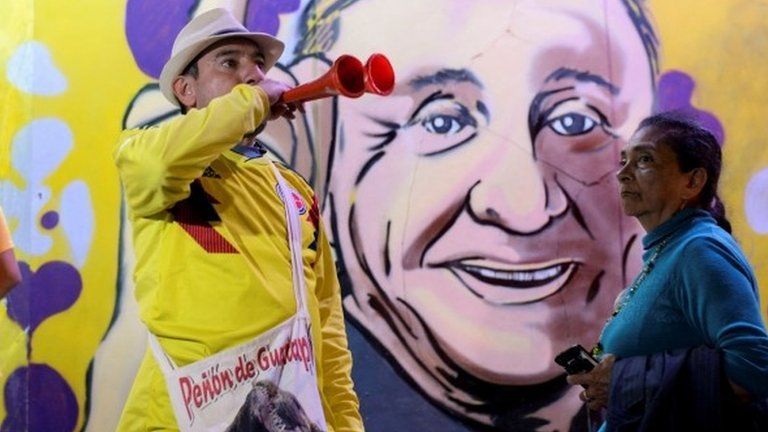 IMAGE SOURCE, REUTERS
IMAGE SOURCE, REUTERSHe also won the sympathy of many Colombians when he was asked in one of his few TV appearances about his daughter.
Juliana Hernández was 23 when she was kidnapped in 2004 by the National Liberation Army (ELN), the smaller of Colombia’s two main left-wing rebel forces.
Rodolfo Hernández says that the ELN demanded a ransom of $2m but that he refused to pay, arguing it would put the rest of his family at a higher risk of kidnapping.
Despite his daughter’s kidnapping, Mr Hernández has said that if he became president, he would be willing to include the ELN in a peace agreement which the Colombian government signed with the larger of the two Colombian rebel groups, the Revolutionary Armed Forces of Colombia (Farc) in 2016.
How such an agreement would come about after previous attempts at negotiation with the ELN failed is not clear.
Mr Hernández has also said that he backs the peace agreement reached with the Farc, even though he voted against it in a 2016 referendum.
The main thrust of his campaign has been his anti-corruption message. On Sunday, he said that the “nation of honesty” had won. “Today the cliques which thought they could govern forever have lost,” he added.
However, he has given very little detail as to how he plans to fight corruption and his critics have pointed out that he himself has been accused of corruption.
He has vehemently denied any wrongdoing, even going as far as slapping a local council member who had accused him of being involved in a corruption scandal.
Gustavo Petro: The ex-rebel who embraced politics
Even though Gustavo Petro won the first round comfortably, the second round could prove tricky for the left-wing contender.
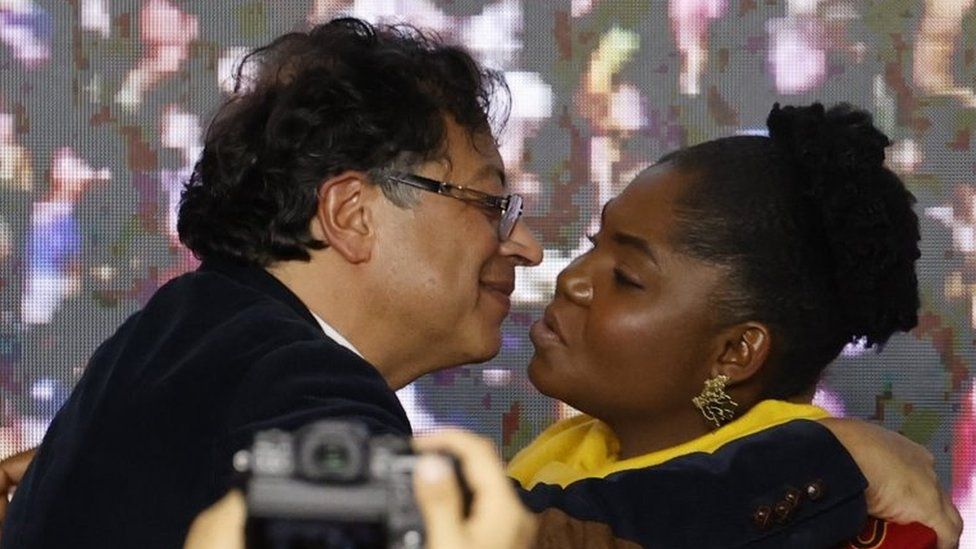 IMAGE SOURCE, EPA
IMAGE SOURCE, EPAThe third-placed candidate, Fico Gutiérrez, has already endorsed Mr Hernández and there is a strong campaign by right-wing forces urging voters “to keep Petro out”.
Opinion polls had suggested that Mr Petro would have beaten Fico Gutierrez in the second round as the latter was seen as a “continuity candidate” at a time when many Colombians are clamouring for change.
But beating another candidate who portrays himself as being anti-establishment is likely to prove much harder for Mr Petro.
Add to that the fact that Mr Hernández’s proposals are so vague that they are proving hard to counter, and suddenly the second round looks wide open.
Speaking after his first-round win, Mr Petro sounded defensive. “Corruption isn’t fought with TikTok slogans, even if some very respectable people think so,” he said clearly alluding to his rival for the presidency.
 IMAGE SOURCE,REUTERS
IMAGE SOURCE,REUTERS“We’re not here to trap you with rhetoric, but to confront you with the facts and tell Colombian society clearly where we are headed,” he added, venting some of the frustration more established politicians have felt vis-à-vis Mr Hernández.
One factor which is likely to play in Mr Petro’s favour is his running mate, Francia Márquez.
The Afro-Colombian environmentalist and rights activist has proven a powerful ally who has attracted female, rural and marginalised voters who may not have otherwise warmed to Mr Petro.
While Mr Hernández also chose an Afro-Colombian woman, Marelen Castillo, as his vice-presidential candidate, Ms Castillo has been much less visible.
Labelled “the unknown candidate” by one newspaper, Ms Castillo has very rarely appeared in public and was nowhere to be seen in the Facebook video Mr Hernández uploaded on Sunday night to thank voters for propelling him into the second round.
Francia Márquez on the other hand has been a formidable campaigner who has inspired many Colombians through her rise from working as a cleaner to running for vice-president.
But there remain many who find Gustavo Petro’s past as a member of the M-19 guerrilla too hard to stomach, even though the rebel group was dissolved decades ago and Mr Petro has had a long career as a democratic politician.
Whether he manages to soften some of that anti-Petro sentiment will likely decide whether it is he or “the king of TikTok” who governs Colombia for the next four years.
-
Election run-off for ex-rebel and ‘Colombia’s Trump’
17 hours ago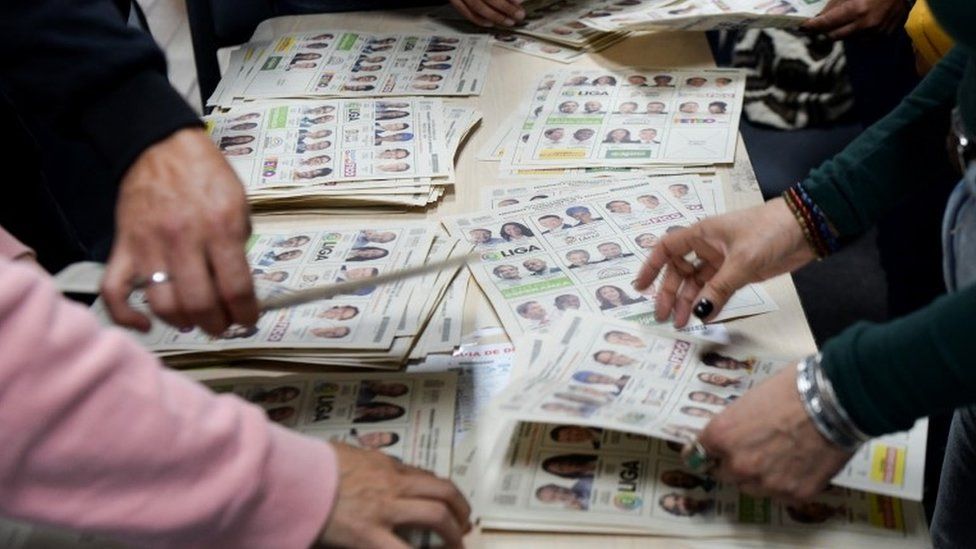
-
Ex-rebel secures nomination in Colombia primary
14 March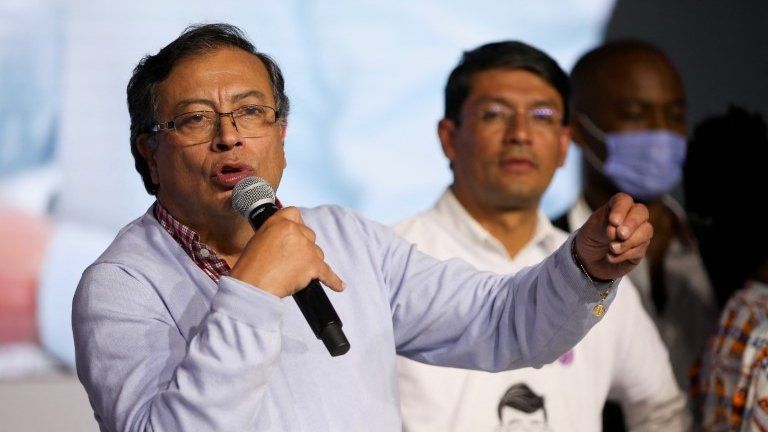
-
Ex-rebel hostage to run for Colombian presidency
19 January